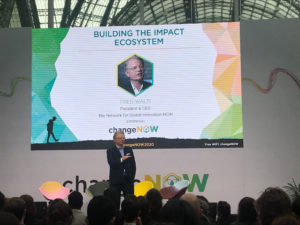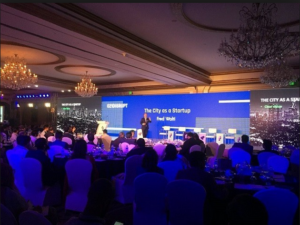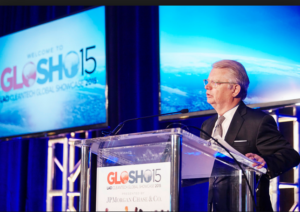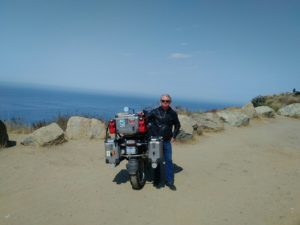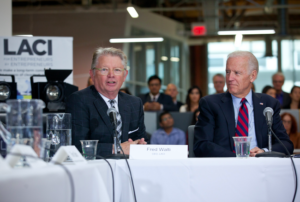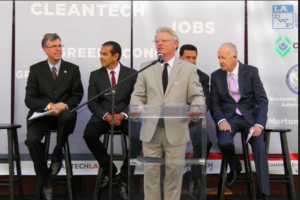Fred Walti Keynote Speaking Topics
Fred Walti is the founding CEO of one of the world’s most effective innovation hubs, the Los Angeles Cleantech Incubator which leads LA’s efforts to build a green economy. Mr. Walti is now the CEO of the Network for Global Innovation, a global ecosystem supporting cleantech entrepreneurs with 28 members in 14 countries. Mr. Walti is a serial entrepreneur having started 11 companies over the past 20 years. Mr. Walti believes that entrepreneurial techniques and innovation ecosystems can be applied to the world’s most challenging problems. Mr. Walti has spoken over 75 times in more than 25 cities around the world.
TOPIC: “The City as a Start Up: Driving Innovation In Mega Cities”
FORMAT: 20 minutes with slides
AUDIENCE: Government and policy leaders, innovation professionals, entrepreneurs, students
ABSTRACT: Innovation drives economic development – globally. Modern mega cities must create an environment that attracts innovators and risk-takers, and then provide them with the culture, resources and policies that will turn ideas into jobs and smarter living. Cities need to act more like a start-up.
Mr. Walti’s premise is that smart mega cities must adopt innovation as a key economic driver that simultaneously reduces its pollution and improves its quality of life. The “City as a Start-up” concept is a new cultural change that cities are now embracing that encourages risk taking, investment in sustainable game-changing, faster decisions, and more private public partnerships with successful entrepreneurs. Cities have to become more agile, create regional innovation hubs, and harness their purchasing power toward achieving a wide range of city quality of life goals.
Mr. Walti will present a case history in how Los Angeles created a world-class innovation hub, thus helping to build the U.S.’s largest green economy. As CEO of LACI, Mr. Walti led the City’s efforts to develop sustainable technologies across a wide range of business sectors from transportation to agriculture. LACI has ranked in the Top 10 among 1200 University-Associated business Incubators by the UBI research firm for three years in a row. Mr. Walti will explain how the City of Los Angeles, in partnership with entrepreneurs, built LACI into a regional cleantech innovation center that has returned $360M in long-term economic benefit for the City of Los Angeles. This case study is an example of a mega city harnessing its resources to become nimbler, more conductive to innovation, and with connections to world markets.
Mr. Walti will share the LACI/NGIN Innovation Ecosystem Development Model that can be used by mega cities around the world to embrace the “City as a Start-up” philosophy. The model serves as a framework for successfully commercializing sustainable technology innovation by explaining the seven core elements necessary to create a high-performance innovation hub.
The City as a Start Up also means connecting to global markets in order to attract investors, customers, entrepreneurs, scientists and thought leaders. Mr. Walti formed the Network for Global Innovation, a network of premier innovation institutions in 14 countries, in order to connect sustainable technology innovation hubs in across the globe. Becoming part of the global community means that cities share their successes, learn from other’s programs, and make it easy for the innovators to do business with each other.
Today, global mega cities must shed their shackles of conventional thinking and embrace the risk-taking, investment, agility and growth that has made start-ups successful.
TOPIC: “An Innovation Roadmap that Drives Economic Development, Improves Quality of Life, and Mitigates the Upcoming Disruption Caused by Automation”
FORMAT: 20-30 Minutes with slides
AUDIENCE: Government and policy leaders, innovation professionals, entrepreneurs, students,
ABSTRACT: For the past ten years, Mr. Walti has been building innovation ecosystems focused on sustainable technologies. His work in California, Washington State, Florida, Mexico City, Ethiopia, Australia, and many other parts of the developing world have led to new thinking on how to drive economic development through comprehensive, interconnected innovation ecosystems:
Cites from Karachi to Orlando to Mumbai to Seoul face common problems that are eroding the quality of life of their citizens. Chief among these threats is the unemployment, homelessness and general societal disruption that automation will cause. While these problems are not new and are generally acknowledged, progress against these issues remains insufficient and inconsistent.
Mr. Walti posits that the economies of most cities are based on low-paying, low value-add industries that are the most vulnerable to disruption. As a result, cities need to fundamentally rethink the role of innovation and make it the centerpiece of their economic development policy. Mr. Walti will explain and give case histories on how to build an Innovation Roadmap that will transform the economies of those who adopt it.
TOPIC: “An Entrepreneur’s Journey: How I Went from Motorcycle Racer to Cleantech Entrepreneur”
FORMAT: 20 minutes with slides
AUDIENCE: General, entrepreneurs, students,
ABSTRACT: Mr. Walti is a serial entrepreneur having started 12 organizations during his career. He tells the story of his journey from professional motorcycle racer and family outcast to advertising executive, internet titan, and builder of the most successful cleantech incubator in the world.
Mr. Walti was at the frontier of three technology revolutions: (1) The personal computer; (2) The Internet; and (3) Clean technology. Mr. Walti shares the lessons learned along the way and offers advice to young entrepreneurs. Mr. compares and contrasts these three technology revolutions. What does this tell future entrepreneurs? Where’s the opportunity?
Mr. Walti speaks about what it means to be an entrepreneur and what he’s learned as a serial entrepreneur. Moreover, he provides practical advice on how any organization can be become more entrepreneurial. Mr. Walti explains the “NGIN High Performance Boot Camp” that any organization’s leadership may attend.
TOPIC: “How Design Has Enabled the Great Technology Breakthroughs”
FORMAT: 20 minutes with slides
AUDIENCE: Graphic/product designers, students, product development professionals
ABSTRACT: Mr. Walti has been at the frontier of three technology revolutions: (1) The personal computer; (2) The Internet; and (3) Clean technology. Mr. Walti shares the lessons on how the integration of design/technology/business strategy has produced the great product breakthroughs of our time.
Mr. Walti has worked with dozens of cleantech entrepreneurs and has seen the need for design thinking for the future of clean technologies and climate change.
TOPIC: “A Practical Guide to Building Innovation Ecosystems That Work”
FORMAT: 20 minutes with slides
AUDIENCE: City innovation officers, Incubator/ accelerator managers and staff, economic development professionals.
ABSTRACT: Mr. Walti unveils the practical tools he uses to build innovation hubs that drive innovation, improve the quality of life, and prepare cities/regions for the future.
The NGIN Innovation Ecosystem Model: This model was first developed for Los Angeles and has since been refined and deployed in both developed and developing markets. Mr. Walti explains the seven key components of the Model (Leadership, Sources of Innovation, Innovation Engines , Funding Access, Talent Development, Stakeholder Mobilization, and Access to Local/Global Markets. Mr. Walti will give real world case histories.
Distributed Innovation Hubs: The most important element of the Model is how the individual components are integrated. For larger hubs in larger cities, the NGIN Hub & Spoke Model is an effective approach. But, how do you get an entire region working together to develop an innovation ecosystem across multiple cities, institutions and organizations? The next step in innovation hubs is the Distributed Innovation Ecosystem which precisely ties together all the stakeholders in a region-wide innovation ecosystem. Mr. Walti will explain what it is, how to develop it, and give specific case histories.
The Innovation Roadmap: A step by step roadmap on how to build an innovation ecosystem from the ground up. This puts the above tools into the context of a long-term, comprehensive redevelopment of a city/region/state’s approach to innovation and economic development.

